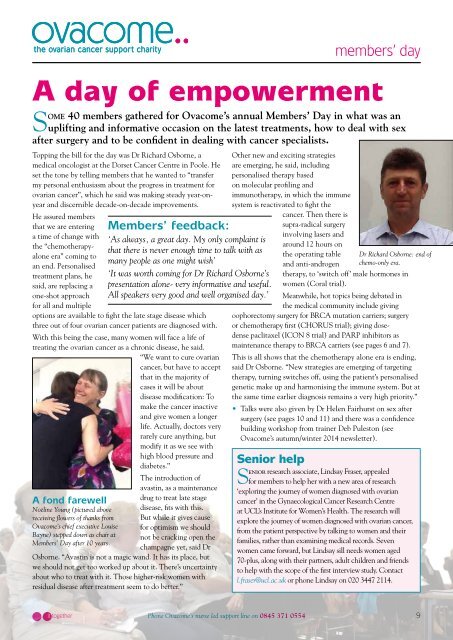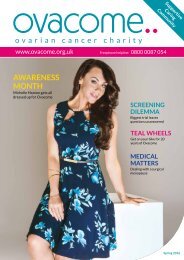Ovacome Summer 2014
Ovacome Summer 2014
Ovacome Summer 2014
Create successful ePaper yourself
Turn your PDF publications into a flip-book with our unique Google optimized e-Paper software.
A day of empowerment<br />
Some 40 members gathered for <strong>Ovacome</strong>’s annual Members’ Day in what was an<br />
uplifting and informative occasion on the latest treatments, how to deal with sex<br />
after surgery and to be confident in dealing with cancer specialists.<br />
Topping the bill for the day was Dr Richard Osborne, a<br />
medical oncologist at the Dorset Cancer Centre in Poole. He<br />
set the tone by telling members that he wanted to “transfer<br />
my personal enthusiasm about the progress in treatment for<br />
ovarian cancer”, which he said was making steady year-onyear<br />
and discernible decade-on-decade improvements.<br />
He assured members<br />
that we are entering<br />
a time of change with<br />
the “chemotherapyalone<br />
era” coming to<br />
an end. Personalised<br />
treatment plans, he<br />
said, are replacing a<br />
one-shot approach<br />
for all and multiple<br />
options are available to fight the late stage disease which<br />
three out of four ovarian cancer patients are diagnosed with.<br />
With this being the case, many women will face a life of<br />
treating the ovarian cancer as a chronic disease, he said.<br />
“We want to cure ovarian<br />
cancer, but have to accept<br />
that in the majority of<br />
cases it will be about<br />
disease modification: To<br />
make the cancer inactive<br />
and give women a longer<br />
life. Actually, doctors very<br />
rarely cure anything, but<br />
modify it as we see with<br />
high blood pressure and<br />
diabetes.”<br />
A fond farewell<br />
Noëline Young (pictured above<br />
receiving flowers of thanks from<br />
<strong>Ovacome</strong>’s chief executive Louise<br />
Bayne) stepped down as chair at<br />
Members’ Day after 10 years.<br />
Members’ feedback:<br />
‘As always, a great day. My only complaint is<br />
that there is never enough time to talk with as<br />
many people as one might wish’<br />
‘It was worth coming for Dr Richard Osborne’s<br />
presentation alone- very informative and useful.<br />
All speakers very good and well organised day.’<br />
The introduction of<br />
avastin, as a maintenance<br />
drug to treat late stage<br />
disease, fits with this.<br />
But while it gives cause<br />
for optimism we should<br />
not be cracking open the<br />
champagne yet, said Dr<br />
Osborne. “Avastin is not a magic wand. It has its place, but<br />
we should not get too worked up about it. There’s uncertainty<br />
about who to treat with it. Those higher-risk women with<br />
residual disease after treatment seem to do better.”<br />
Other new and exciting strategies<br />
are emerging, he said, including<br />
personalised therapy based<br />
on molecular profiling and<br />
immunotherapy, in which the immune<br />
system is reactivated to fight the<br />
cancer. Then there is<br />
supra-radical surgery<br />
involving lasers and<br />
around 12 hours on<br />
the operating table<br />
and anti-androgen<br />
therapy, to ‘switch off’ male hormones in<br />
women (Coral trial).<br />
Meanwhile, hot topics being debated in<br />
the medical community include giving<br />
oophorectomy surgery for BRCA mutation carriers; surgery<br />
or chemotherapy first (CHORUS trial); giving dosedense<br />
paclitaxel (ICON 8 trial) and PARP inhibitors as<br />
maintenance therapy to BRCA carriers (see pages 6 and 7).<br />
This is all shows that the chemotherapy alone era is ending,<br />
said Dr Osborne. “New strategies are emerging of targeting<br />
therapy, turning switches off, using the patient’s personalised<br />
genetic make up and harmonising the immune system. But at<br />
the same time earlier diagnosis remains a very high priority.”<br />
• Talks were also given by Dr Helen Fairhurst on sex after<br />
surgery (see pages 10 and 11) and there was a confidence<br />
building workshop from trainer Deb Puleston (see<br />
<strong>Ovacome</strong>’s autumn/winter <strong>2014</strong> newsletter).<br />
Senior help<br />
members’ day<br />
Dr Richard Osborne: end of<br />
chemo-only era.<br />
Senior research associate, Lindsay Fraser, appealed<br />
for members to help her with a new area of research<br />
‘exploring the journey of women diagnosed with ovarian<br />
cancer’ in the Gynaecological Cancer Research Centre<br />
at UCL’s Institute for Women’s Health. The research will<br />
explore the journey of women diagnosed with ovarian cancer,<br />
from the patient perspective by talking to women and their<br />
families, rather than examining medical records. Seven<br />
women came forward, but Lindsay sill needs women aged<br />
70-plus, along with their partners, adult children and friends<br />
to help with the scope of the first interview study. Contact<br />
l.fraser@ucl.ac.uk or phone Lindsay on 020 3447 2114.<br />
it together<br />
Phone <strong>Ovacome</strong>’s nurse led support line on 0845 371 0554 9



